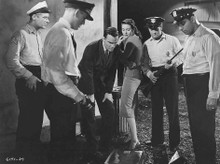 Loading... Please wait...
Loading... Please wait...New Products
Our Newsletter
Product Description
4D Man (1959)
Director:
Irvin S. Yeaworth Jr.Writers:
Theodore Simonson (screenplay), Cy Chermak(screenplay)Stars:
Robert Lansing, Lee Meriwether, James CongdonJames Congdon plays Tony Nelson, a brilliant but foolhardy young scientist who is experimenting with matter and its relationship to time and space. Using a specially designed amplifier, he thinks he has found a way of releasing matter from the time and space that it occupies, thus allowing its atoms to freely intermingle with any surrounding matter without losing its integrity. After accidentally destroying the lab where he is working, he goes to his older brother Scott (Robert Lansing) for help. Scott is even more brilliant than Tony, but is his opposite in every other way: very orthodox, highly respected in his field, and also horribly overworked in his job and responsibilities. The two also have a fiercely competitive relationship that becomes more strained when Tony develops an attraction to Linda Davis (Lee Meriwether), Scott's fiancée. In testing Tony's equipment, Scott gets the experiment to work, passing one object through another, and achieves much more; his own hand accidentally passes through one of the test objects, gets caught, and then released. When he tries to repeat the experiment for Tony, he again passes his hand through the test object, and then discovers that the amplifier isn't functioning properly; the power to move into 4D is now being channeled through his own brain. He can pass through any solid object at will, and the previously staid, stolid scientist is uncharacteristically exultant at this success, though it seems to nullify the project he has spent years working on, the development of a supposedly impenetrable substance. Possessing this power causes Scott's basest desires to emerge for the first time; he starts out by going on a robbery spree, passing through locked bank vaults and stealing the financial reward that has been denied him in his job. The truly dire consequences of his new-found powers emerge the next morning, however, when Scott awakens to discover that he looks and feels at least 15 years older; apparently, using his new ability to move into 4D drains his life force. Worse yet, he discovers that he can replenish his life energy, but only by passing himself through people; this contact restores him, but accelerates their aging so that they shrivel up and die in seconds. Scott is riven by the struggle between his basic decency and his desire to survive, coupled with his now unbridled lust and greed, and the body count keeps rising as he rampages through the city. The police are unable to stop him, and Tony, feeling more responsibility than he's ever displayed before, prepares to turn the 4D amplifier on himself so that he can battle his brother. It is Linda, however, who takes the ultimate risk, luring Scott back to normal one last time. The story is exciting (albeit a bit grim) and played in a lively fashion, and the careful use of Ralph Carmichael's jazz-based score to accent the action also helps set 4D Man apart from other science fiction films of the era.
Here is the link to the film at the Internet Movie database: http://www.imdb.com/title/tt0052530/?ref_=fn_tt_tt_1
Currency Converter
Choose a currency below to display product prices in the selected currency.


















